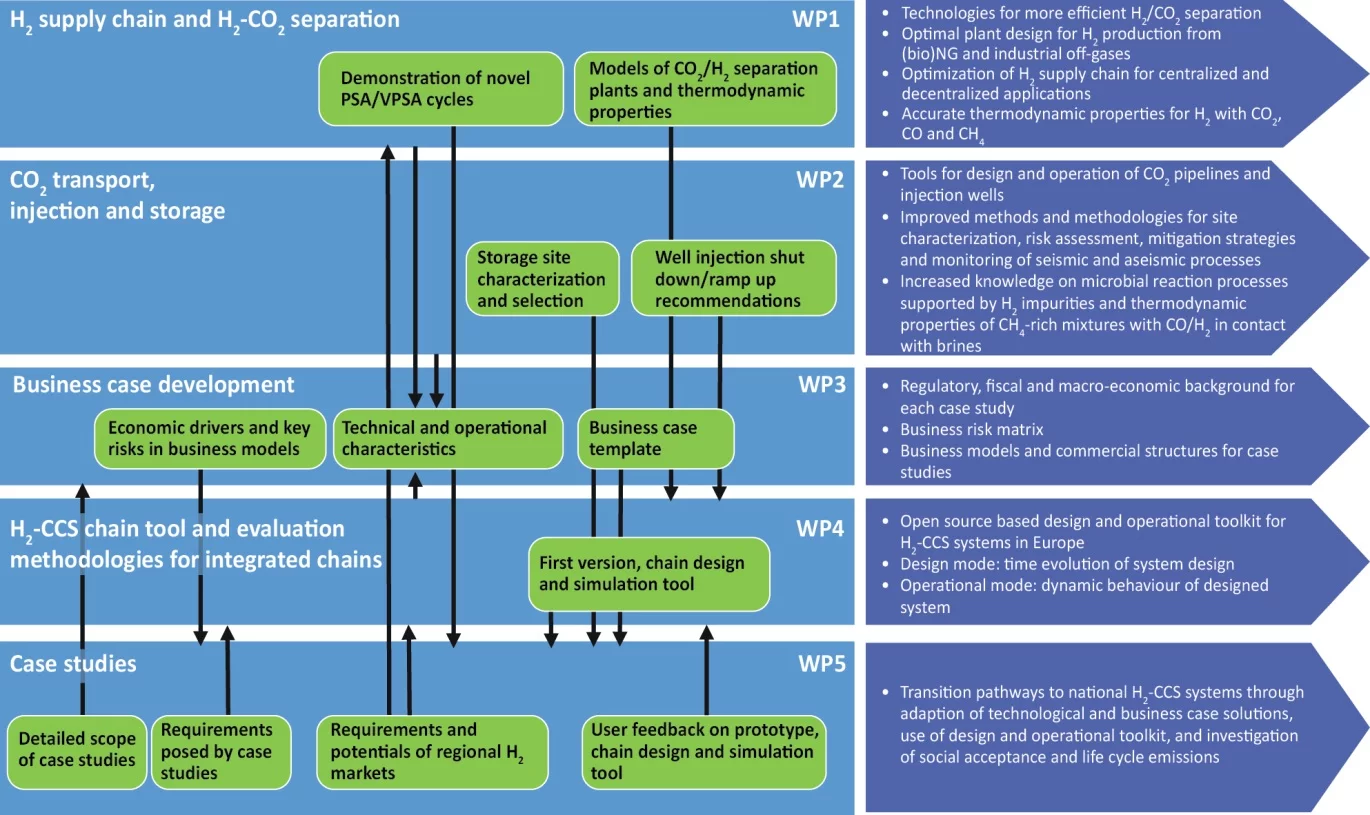ELEGANCY
Enabling a Low-Carbon Economy via Hydrogen and CCS
CCS is an essential component in 114 of 120 scenarios with 0.9–2.3°C global warming above pre-industrial levels in the IPCC Fifth Assessment Report. Decisions on full-scale CCS deployment need to be made as a matter of urgency in order for Europe to achieve the steep build-out required to deliver on the Paris Agreement – and avoid irreversible climate change. ELE-GANCY is designed specifically to provide the knowledge needed to make such decisions on an informed basis. To this end, ELEGANCY will:
- Develop and demonstrate effective CCS technologies with high industrial relevance.
- Identify and promote business opportunities for industrial CCS enabled by H2 as a key energy carrier by performing five national case studies.
- Validate key elements of the CCS chain by frontier pilot- and laboratory-scale experiments using inter alia ECCSEL and EPOS research infrastructure.
- Optimize combined systems for H2 production and H2-CO2 separation by combining basic science with the technology developments necessary for increased TRL of these systems.
- De-risk storage of CO2 produced from NG reforming for H2 production by providing experimental data and validated models.
- Enable safe, cost-efficient design and operation of key elements of the CCS chain by developing cutting edge, innovative design and simulation tools.
- Provide an open source techno-economic design and operation simulation tool for the full CCS chain, including H2 as energy carrier.
- Assess societal support of key elements of CCS, enabling early identification and mitigation of risks
ELEGANCY will conduct five national case studies (WP5) on the implementation of H2-CCS chains. The goal: to demonstrate how H2-CCS is a flexible strategy that can provide the economic driver for fast-track CCS easily adaptable to the infrastructural, social, economic and political constraints of different Euro-pean countries:
- Identify a credible path for the decarbonization of the Dutch industry by specifying an H2-CCUS chain, including the regional possibilities for CO2 capture, H2 usage in industry and residential heating, CO2 usage in greenhouses, as well as offshore CO2 storage.
- Plan for the decarbonization of the Swiss road transport sector by introducing clean H2, accelerating the Swiss CCS/geothermal roadmap to fast-track CCS, and studying solutions with carbon negative emissions – as called for by the Paris Agreement.
- Support planning for large-scale decarbonization of UK cities and industrial clusters, by conversion from natural gas to H2 infrastructure for the first three cities in the H21 Roadmap project, to inform key policy decisions and commitment to build in 2021, considering the technical, operational, legal and financial aspects including industrial integration.
- Accelerate the decarbonization of German gas infrastructure via an H2-CCS chain, addressing the technical, economic, legal and social aspects that will influence the decision to build either a new pure H2 distribution network or mix H2 into the existing NG network.
- Develop an optimal strategy and infrastructure investment scenario for Norwegian H2 export and utilization, including the location of H2 production, CO2 storage and transport of both gases to/from Conti-nental Europe in synergy with the Norwegian full-scale CCS project.
The Energy Economics Group is involved in the Swiss case study with the Swiss TIMES energy systems model (STEM). The model will be enhanced in the representation of the hydrogen production, distribution and consumption chains, to be able to generate a roadmap for the decarbonisation of the transport sector using clean H2.
Partners
- SINTEF Energy Research
- Arntzen de Besche
- Aker Solutions
- Gassco AS
- Imperial College London
- British Geological Survey
- Scottish Enterprise
- Sustainable Decisions Ltd
- INEOS Chemicals Grangemouth Limited
- ETH Zürich
- Swiss Competence Center for Energy Research – Supply of Electricity
- Paul Scherrer Institute
- Climeworks AG
- Energie 360°
- First Climate AG
- Ruhr-University
- Open Grid Europe
- Uniper Energy Storage
- Energy Research Centre of the Netherlands
- Netherlands Organisation for Applied Scientific Research
- Utrecht University
- Shell
- Swerea MEFOS
- Groupe Européen de Recherches Gazières

